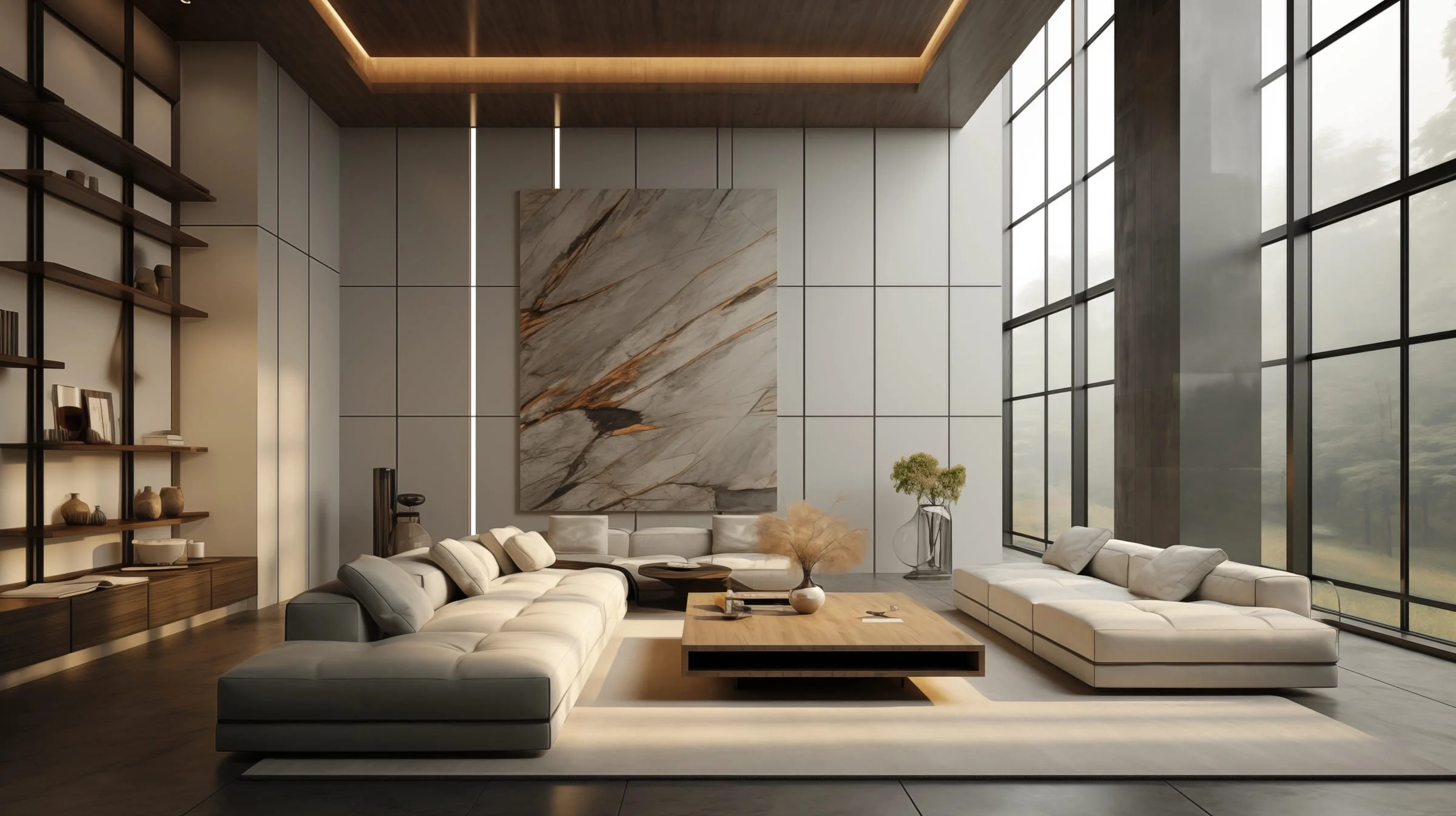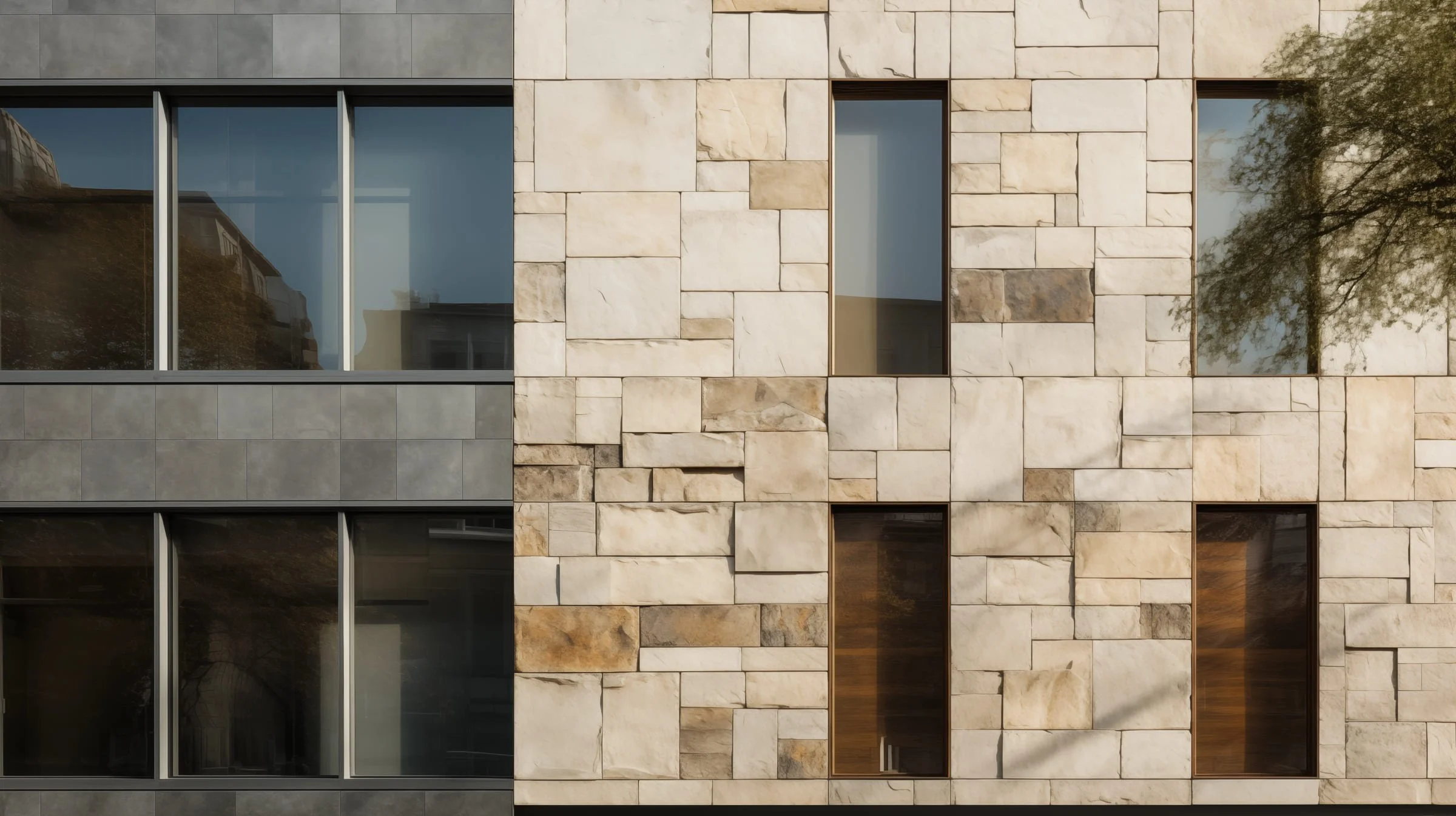Stone Wall Trends for 2024: What's In and What's Out
Architects today are not just creators of spaces but curators of sustainable, functional, and innovative materials that define our built environment. Stone walls, with their rich history in architecture, continue to evolve, adapting to the latest trends in design, technology, and environmental consciousness. In this detailed exploration, we delve into the stone wall trends for 2024, providing a roadmap for architects who aim to lead in the design of contemporary spaces.
Understanding the Shift in Stone Wall Trends
This modern building features minimalist stone walls with precise cuts and custom shapes. Integrated technology and green landscaping highlight the use of sustainable materials and innovative design techniques, creating an eco-friendly environment.
The Rise of Minimalist and Eco-Friendly Designs
In 2024, architectural design continues to embrace minimalism—a style that emphasizes simplicity and functionality, coupled with a strong preference for eco-friendly materials. Stone, known for its durability and low environmental impact when sourced responsibly, is increasingly favored in eco-conscious designs. The use of local stone not only reduces transportation emissions but also supports local economies, making it a cornerstone of sustainable architectural practices.
Technological Innovations in Stone Processing
Advancements in stone processing technology have broadened the capabilities of this age-old material. Precision cutting, 3D printing in stone, and automated texturing are some of the innovations that allow for more intricate designs and efficient use of stone, making it more competitive against other modern materials. These technologies enable the creation of unique, customized stone shapes and finishes that were once impossible, offering architects new creative freedoms.
What's In: The Trends to Embrace
Natural and Textured Stone Finishes
Textured finishes in stone such as bush-hammered, flamed, or naturally split are gaining traction for their ability to add depth and natural beauty to architectural surfaces. These textures enhance the stone’s natural color variations and shadows, playing with light and adding a dynamic visual element to both exterior facades and interior walls.
This modern office building showcases textured stone finishes, including bush-hammered, flamed, and naturally split surfaces. The facade emphasizes depth and natural beauty, blending seamlessly into the contemporary urban setting.
Large-Format Stone Panels
Seamlessness in design is a key trend, achieved spectacularly through the use of large-format stone panels. These panels lend a smooth, continuous look that enhances the spatial aesthetics of large areas. They are particularly effective in minimalist designs where the continuity of surfaces is paramount, providing a clean, modern look with fewer joints and interruptions.
This luxury home interior highlights large-format stone panels on the living room walls, creating a seamless, modern aesthetic. The spacious, minimalist design is complemented by sleek furniture and abundant natural light.
Integrated Technology in Stone Walls
Stone walls are not just passive elements but are increasingly becoming interactive components of building design. Technologies such as embedded sensors, programmable LED arrays, and climate adaptive surfaces turn traditional stone walls into active parts of a building's environmental systems, enhancing both functionality and energy efficiency.
Color Variation and Matching
The custom selection of stone hues allows architects to create more personalized and visually engaging designs. By carefully matching or contrasting stone colors, designers can achieve stunning visual effects that complement or highlight other architectural elements, making each project unique and deeply reflective of its environment.
This architectural design showcases an exterior stone wall with a beautiful palette of color variations. Different shades of stone blend harmoniously, enhancing the building’s aesthetic appeal and creating a visually striking facade.
Recycled and Composite Stone Products
Eco-friendly design solutions are increasingly important, and recycled or composite stone products are at the forefront of this trend. These materials not only help reduce waste but also offer improved properties such as better thermal insulation and reduced water absorption, making them ideal for both structural and aesthetic purposes in modern architecture.
Breeze Block Walls
Breeze blocks, once a hallmark of mid-century modern design, are seeing a resurgence in architectural applications, particularly in climates where ventilation and shade are crucial. These decorative concrete blocks, often with geometric patterns, are being reinvented in stone to blend traditional charm with modern functionality. Architects are now using stone breeze blocks to create visually striking facades that offer not only aesthetic appeal but also practical benefits like improved air circulation and natural light diffusion.
Breeze blocks, a mid-century modern design staple, are making a comeback. Jonite's decorative stone breeze blocks blend traditional charm with modern functionality, creating visually striking facades. This home in Singapore uses our breeze blocks to enhance aesthetic appeal, air circulation, and natural light diffusion.
What's Out: Trends Phasing Out
Overly Rustic Stone Walls
The preference is shifting towards a more refined rustic look that integrates with modern designs, moving away from heavy, overly textured rustic stone that can overpower a space. This refined approach uses rustic elements as accents to add character and warmth without dominating the aesthetic.
This rustic stone cottage exemplifies the traditional heavy rustic style with its overly textured stone walls and uneven stones. While charming, this style is being replaced by more contemporary approaches that balance aesthetics with functionality.
Thin Stone Veneers
While once popular for their cost-effectiveness, thin stone veneers are falling out of favor due to their lack of durability and authenticity. Thicker, genuine stone is preferred for its lasting quality and substantial visual impact, echoing the broader trend towards materials that offer both aesthetic and functional longevity.
This image highlights the shift from thin stone veneers to more robust, thick stone applications in building facades. The left side shows thin, uniform veneers, while the right side demonstrates the authenticity and durability of thicker stone, reflecting modern architectural preferences.
Highly Polished Stone Surfaces
The trend is moving away from highly polished finishes, which do not perform well in outdoor applications and are prone to showing wear and tear. Matte and honed finishes are becoming more popular for their natural appearance and greater practicality, especially in high-traffic areas.
Highly polished finishes, as seen in this luxury hotel lobby, are declining in popularity for outdoor use due to their performance issues and tendency to show wear. The trend towards matte and honed finishes offers a more durable and aesthetically pleasing solution for contemporary architectural designs, ensuring longevity and reducing maintenance needs.
Standard Block Sizes
Customization is key in contemporary architecture, making standard block sizes less desirable. Custom-sized stone blocks allow for unique design solutions and help in achieving more integrated and visually appealing architectural elements.
Decorative Only Stone Applications
Stone is being reevaluated for its functional benefits, not just its aesthetics. Modern stone applications are expected to contribute to the building's thermal performance, structural integrity, and environmental sustainability, surpassing their role as mere decorative features.
__________________________________________________________________________________________________________________
The stone wall trends for 2024 reflect a profound shift towards sustainability, technological integration, and personalized design in architecture. By adopting these trends, architects not only ensure their projects are aesthetically pleasing but also functionally advanced and environmentally responsible. As we continue to push the boundaries of what stone can offer, we pave the way for innovative designs that are both timeless and reflective of contemporary architectural values.









